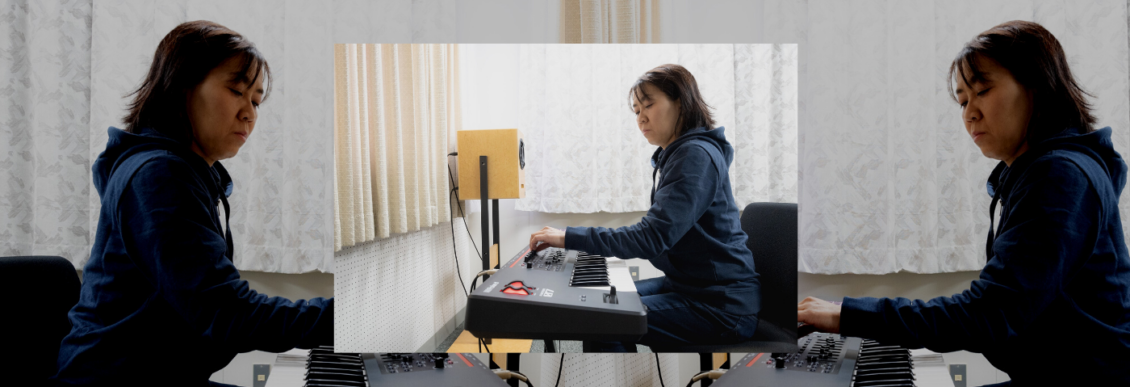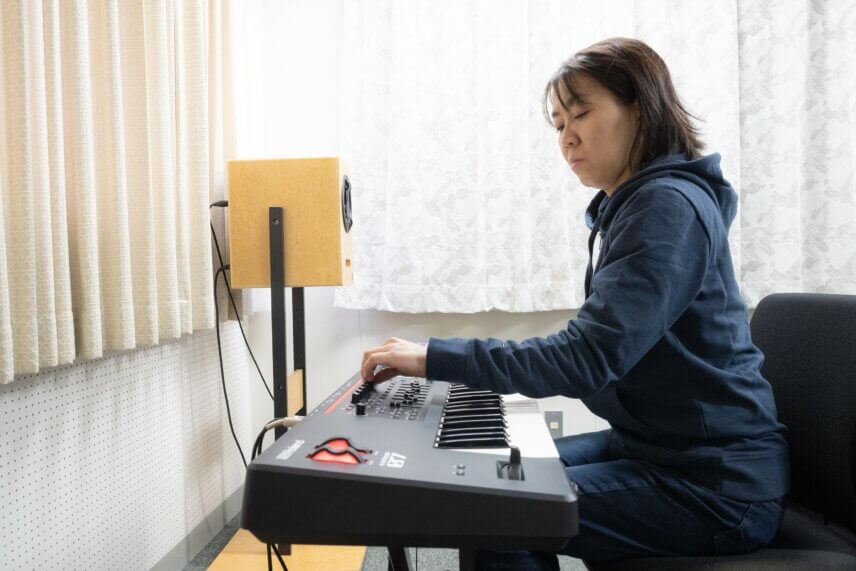CD, CD Çalar, DVD, DVD Çalar, SACD, LP, Plak Çeşitleri ve Fiyatları

For International Women’s Day we talked to five women engineers working in the synthesizer industry about their jobs. This time, we speak with Yoriko Matsushita at Roland.
No matter which way you cut it, engineering is a male-dominated field. This also includes the musical instrument industry. On average, the percentage of women working in engineering fields is below 20%. While this amount has promisingly increased over time, it still remains low in comparison to men.
However, numbers don’t really tell stories, people do. What is it really like for women working in the hardware synthesizer industry, a traditionally male-dominated field? For this year’s International Women’s Day, we talked to five women who design and engineer synthesizers – both traditional and modular – to hear their stories.
This time, we’re sitting down with Yoriko Matsushita from Roland. She’s in the Sound Contents Development Group in the Synthesis Development Department at Roland’s headquarters in Hamamatsu, Japan.
The interview was edited for clarity and brevity.

Attack Magazine: What is it that you like about synthesizers?
Yoriko Matsushita: They have the potential to create unknown sounds that you have never experienced before.
How did you get started working with synthesizers?
I heard TM Network (a Japanese synth-pop band that was very popular all through the 1980s) at the age of 14 and was impressed by the music produced by Tetsuya Komuro. I wanted to work to support the artists like him, so I got my current job.
[quote align=right text=”I think the essential thing to be a synth designer is the combined comprehension of technology, engineering and art, which is not something that only men can do..”]
What do you do at your job?
My current job is to create sounds to build into products. In the past, I was a part of the development team for FANTOM’s Model Expansions, such as RD-88, FR-4x, FP-E50, and so on. I was also a firmware designer and programmer.
[advert]
What is it you like about your job?
It is a job that requires a lot of effort, but (I love) the sense of accomplishment when the product is completed and released. Also as it goes to the market, I (can) see the clear reaction to my work, which is good for me.
Is there anything you don’t like?
There may be trivial things in everyday life but no, basically. I think of myself as working in a blessed environment. I have faced many difficult professional challenges, but I recall them as very valuable experiences.
Would you say that the synthesizer industry is a generally accepting place for women?
Regardless of gender, I think it is an open place if you are interested in synthesizers. And there are many female artists using synthesizers. I think the essential thing to be a synth designer is the combined comprehension of technology, engineering and art, which is not something that only men can do.
[advert]
Have you ever encountered chauvinism in your industry?
I don’t think so. There were no cases where I had to be conscious of my gender. Most of the people I have worked with have had neutral views and didn’t discriminate based on capability, principles or gender.
[quote align=right text=”In recent years, many talented female engineers have joined Roland. Given the relatively (recent) history of modular synth manufacturers, I don’t think there’s much difference between what’s happening for female engineers here and there today.”]
A lot of the women we’re talking to work in the modular synthesizer industry rather than the traditional synth one. Why do you think this is?
I guess it is based on how people see engineering and technology in each period of time. When I entered this industry 28 years ago, there were very few female engineers, but it was the trend everywhere, not only in the synth industry.
I joined Roland simply because I had the impression that the company has a lot of innovative products and momentum. On the other hand, back then, engineering and technology were regarded as inconspicuous background jobs, and it was difficult to find the glamorous aspect (at least in Japan).
But these days, the degree of our contribution to society has become more visible, thanks to IT penetration and such, and I think that acceptance of engineering and technology is broader. In addition, due to the ongoing diversification of senses of values and ways of thinking, the points and criteria for choosing a career have expanded individually no matter what the gender is.
In recent years, many talented female engineers have joined Roland. Given the relatively (recent) history of modular synth manufacturers, I don’t think there’s much difference between what’s happening for female engineers here and there today. Still, male engineers are the majority by number but I feel that the ratio of men and women will be closer in the future.
What advice would you give to young women who want to do what you do?
I hope that you will not hesitate to take on challenges that interest you. Even if your attempt doesn’t work, what you gain (knowledge, experience, connections, etc.) will always help you in your next endeavor.
Thinking, “What’s the best thing that I can do?” throughout the project is always the core, I think. With such a perspective, your gender and circumstances become meaningless.
I believe that what comes out of that perspective will make things simple and persuasive with no unnecessary elements, and will be something that reaches directly to the end users.
Roland has been featured many times in Attack. Check out this immersive quiz on Roland or this story on Japanese legacy and heritage and it’s impact on dance music.
[product-collection id=”124343″]
Follow Attack
[social-links facebook=”https://www.facebook.com/attackmag” twitter=”https://twitter.com/attackmag1″ instagram=”https://www.instagram.com/attackmag/” youtube=”https://www.youtube.com/user/attackmag” soundcloud=”https://soundcloud.com/attackmag” tiktok=”https://www.tiktok.com/@attackmagazine”]
attackmagazine

For International Women’s Day we talked to five women engineers working in the synthesizer industry about their jobs. This time, we speak with Yoriko Matsushita at Roland.
No matter which way you cut it, engineering is a male-dominated field. This also includes the musical instrument industry. On average, the percentage of women working in engineering fields is below 20%. While this amount has promisingly increased over time, it still remains low in comparison to men.
However, numbers don’t really tell stories, people do. What is it really like for women working in the hardware synthesizer industry, a traditionally male-dominated field? For this year’s International Women’s Day, we talked to five women who design and engineer synthesizers – both traditional and modular – to hear their stories.
This time, we’re sitting down with Yoriko Matsushita from Roland. She’s in the Sound Contents Development Group in the Synthesis Development Department at Roland’s headquarters in Hamamatsu, Japan.
The interview was edited for clarity and brevity.

Attack Magazine: What is it that you like about synthesizers?
Yoriko Matsushita: They have the potential to create unknown sounds that you have never experienced before.
How did you get started working with synthesizers?
I heard TM Network (a Japanese synth-pop band that was very popular all through the 1980s) at the age of 14 and was impressed by the music produced by Tetsuya Komuro. I wanted to work to support the artists like him, so I got my current job.
[quote align=right text=”I think the essential thing to be a synth designer is the combined comprehension of technology, engineering and art, which is not something that only men can do..”]
What do you do at your job?
My current job is to create sounds to build into products. In the past, I was a part of the development team for FANTOM’s Model Expansions, such as RD-88, FR-4x, FP-E50, and so on. I was also a firmware designer and programmer.
[advert]
What is it you like about your job?
It is a job that requires a lot of effort, but (I love) the sense of accomplishment when the product is completed and released. Also as it goes to the market, I (can) see the clear reaction to my work, which is good for me.
Is there anything you don’t like?
There may be trivial things in everyday life but no, basically. I think of myself as working in a blessed environment. I have faced many difficult professional challenges, but I recall them as very valuable experiences.
Would you say that the synthesizer industry is a generally accepting place for women?
Regardless of gender, I think it is an open place if you are interested in synthesizers. And there are many female artists using synthesizers. I think the essential thing to be a synth designer is the combined comprehension of technology, engineering and art, which is not something that only men can do.
[advert]
Have you ever encountered chauvinism in your industry?
I don’t think so. There were no cases where I had to be conscious of my gender. Most of the people I have worked with have had neutral views and didn’t discriminate based on capability, principles or gender.
[quote align=right text=”In recent years, many talented female engineers have joined Roland. Given the relatively (recent) history of modular synth manufacturers, I don’t think there’s much difference between what’s happening for female engineers here and there today.”]
A lot of the women we’re talking to work in the modular synthesizer industry rather than the traditional synth one. Why do you think this is?
I guess it is based on how people see engineering and technology in each period of time. When I entered this industry 28 years ago, there were very few female engineers, but it was the trend everywhere, not only in the synth industry.
I joined Roland simply because I had the impression that the company has a lot of innovative products and momentum. On the other hand, back then, engineering and technology were regarded as inconspicuous background jobs, and it was difficult to find the glamorous aspect (at least in Japan).
But these days, the degree of our contribution to society has become more visible, thanks to IT penetration and such, and I think that acceptance of engineering and technology is broader. In addition, due to the ongoing diversification of senses of values and ways of thinking, the points and criteria for choosing a career have expanded individually no matter what the gender is.
In recent years, many talented female engineers have joined Roland. Given the relatively (recent) history of modular synth manufacturers, I don’t think there’s much difference between what’s happening for female engineers here and there today. Still, male engineers are the majority by number but I feel that the ratio of men and women will be closer in the future.
What advice would you give to young women who want to do what you do?
I hope that you will not hesitate to take on challenges that interest you. Even if your attempt doesn’t work, what you gain (knowledge, experience, connections, etc.) will always help you in your next endeavor.
Thinking, “What’s the best thing that I can do?” throughout the project is always the core, I think. With such a perspective, your gender and circumstances become meaningless.
I believe that what comes out of that perspective will make things simple and persuasive with no unnecessary elements, and will be something that reaches directly to the end users.
Roland has been featured many times in Attack. Check out this immersive quiz on Roland or this story on Japanese legacy and heritage and it’s impact on dance music.
[product-collection id=”124343″]
Follow Attack
[social-links facebook=”https://www.facebook.com/attackmag” twitter=”https://twitter.com/attackmag1″ instagram=”https://www.instagram.com/attackmag/” youtube=”https://www.youtube.com/user/attackmag” soundcloud=”https://soundcloud.com/attackmag” tiktok=”https://www.tiktok.com/@attackmagazine”]